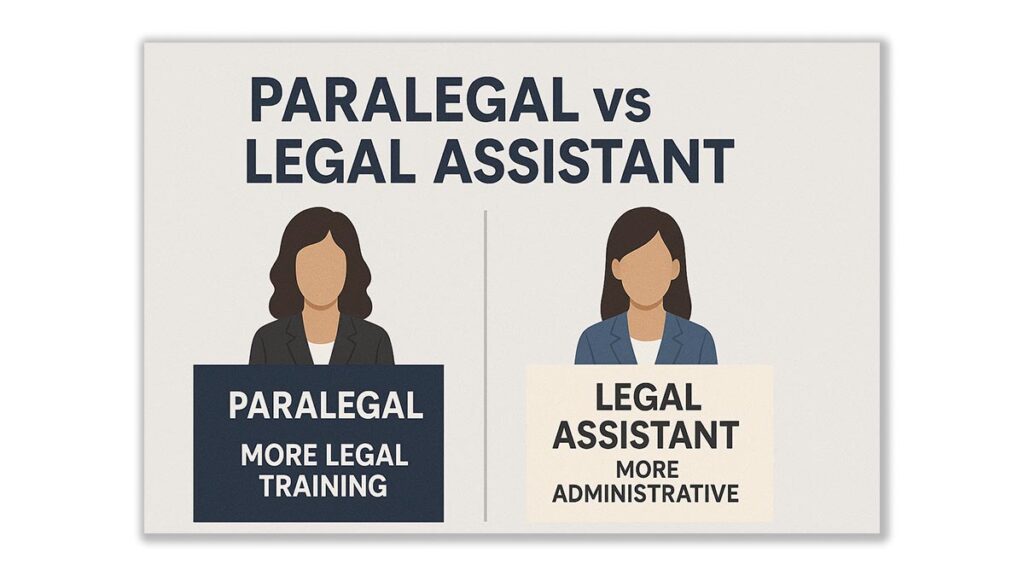Assistant: An assistant is a person—typically a professional—who provides support to another person, often in an administrative or technical capacity. In the legal context, this refers to individuals such as legal assistants or executive legal assistants.
Assistance is the act or process of helping or supporting. It is not a person, but rather the help or support provided. In legal usage, it refers to the function itself: “legal assistance” might refer to help provided to clients, not to a specific job title.
Thus, while assistant refers to who, assistance refers to what.
Comparative Table: Assistant vs Assistance
| Aspect | Assistant | Assistance |
|---|---|---|
| Part of Speech | Noun (person) | Noun (abstract action or help) |
| Legal Usage | “Legal assistant”, “Paralegal assistant” | “Legal assistance”, “Pro bono legal assistance” |
| Refers To | A person in a support role | The help or support provided |
| Subject of Employment Laws | Yes – treated as staff | No – refers to a service rendered |
| Examples | “Our assistant will draft the pleadings.” | “We offer legal assistance to low-income clients.” |
Practical Examples in Law Firms
- A legal assistant is someone hired to assist an attorney with clerical, procedural, and sometimes substantive legal work.
- Legal assistance might refer to the pro bono or public defense support provided to someone in need.
In staffing documentation, HR policies, contracts, and intake forms, the distinction must be preserved. Mislabeling a person as a service, or vice versa, can result in miscommunication, compliance issues, and even payroll classification errors.
Legal Assistant: A Role of Expanding Responsibility
Legal assistants in law firms are often confused with paralegals, and in some jurisdictions, the terms are interchangeable. However, in many firms, a legal assistant performs tasks such as:
- Case file management
- Court filing (physical or e-filing)
- Client intake and coordination
- Drafting procedural documents
- Supporting attorneys with trial preparation
This role may require paralegal certification depending on the state or type of law firm, especially in jurisdictions with legal assistant licensing requirements.
Legal Assistance: A Broader Function of Law
Legal assistance is not a job title—it’s a function. It can refer to:
- Help given to clients through pro bono programs
- Public defenders offering court-appointed legal assistance
- Immigration clinics providing non-profit legal assistance
- Law firms offering reduced-fee legal assistance for veterans
Many government-funded programs use the phrase “legal assistance” as part of their service mandates. For instance, the Legal Services Corporation (LSC) funds organizations that deliver legal assistance to low-income Americans—not to be confused with hiring a legal assistant.
When Language Affects Legal Operations
Language in law is not just semantics—it’s strategy. Confusing assistant vs assistance in:
- Contracts
- Job descriptions
- Intake documents
- Client-facing communication
…can lead to misinterpretation. For example, stating that a firm “offers a legal assistant for review” when it actually means “offers legal assistance” (help) may give the impression that legal advice is being provided by non-lawyers.
Ensuring terminology aligns with state bar guidelines is part of ethical legal practice.
Linguistic Trends in Professional Communication
In modern law firm settings, the rise of virtual assistants and remote legal assistance has further blurred these terms. Firms must standardize the following:
- Legal assistant → refers to a staff role (often virtual or hybrid).
- Legal assistance → refers to legal aid or legal support as a service (remote or in-person).
Technology platforms also use these terms interchangeably, leading to ambiguity in service descriptions.
Can a legal assistant provide legal assistance independently?
No. In the United States, legal assistants (unless certified paralegals with delegated authority) may not provide legal assistance (legal advice or representation) independently.
They must operate under attorney supervision. Unauthorized practice of law (UPL) regulations apply.
Understanding the difference between assistant vs assistance is essential for law firm operations, compliance, and communication. One refers to a professional role within the firm; the other to a function of service provided to clients. Clear usage helps teams avoid ethical missteps and improve client trust.


